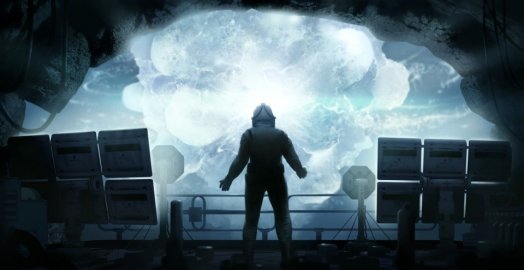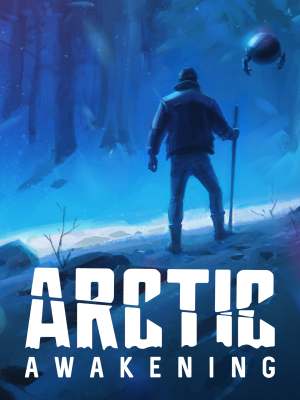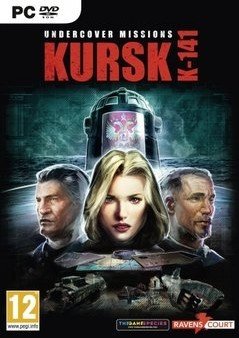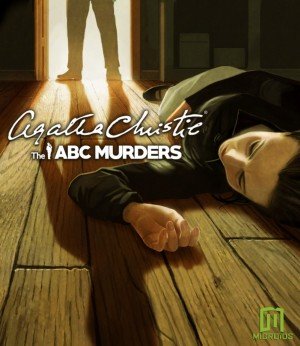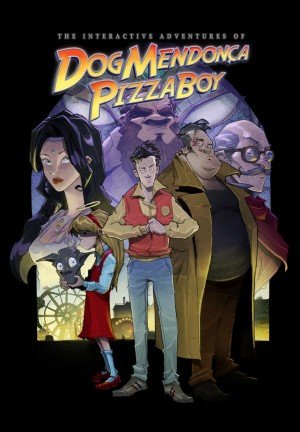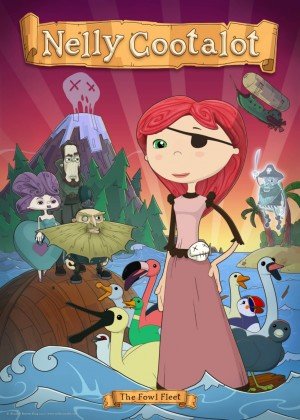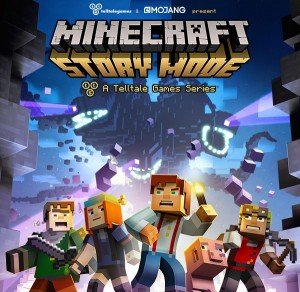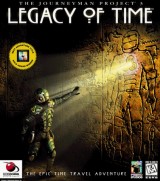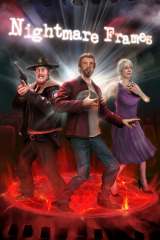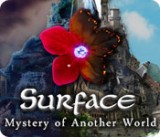Review for P.O.L.L.E.N.
The first day on any new job can be a bit of a nightmare, but that’s especially true for the astronaut hero of P.O.L.L.E.N., from Finnish developer Mindfield Games. When you're sent out on a routine mission to re-establish communication with a remote base, you really rather not find the base eerily abandoned and have the fate of mankind land on your shoulders, all before you've had a chance to break in your new spacesuit. This scenario does make for a compellingly-realised vision of classic sci-fi horror exploration, however, although it’s filled with more big ideas than it knows what to do with and narrative pieces that don't always mesh particularly well.
It may sound like the story is set in the distant future, but in fact events take place in an alternate 1995, one where the attempted assassination of John F. Kennedy failed, the Cold War turned instead to warm co-operation, and the development of anti-gravity technology propelled us to the further reaches of the solar system by the 1980s. It's not all good news, though: computer technology is lagging behind, with even the most optimistic of futurists predicting it'll take until 2020 to put a PC in every home. We can put research bases on Saturn's moons, but the computers there still use punch cards.
Leading the charge in interplanetary exploration is Rama Industries. Despite a catastrophic accident on Europa that killed all but one of the researchers there, the discovery of a mysterious entity (imaginatively entitled "the Entity") on Titan was just too tempting to resist. A team of five researchers was sent to investigate, but all contact with them has now been lost. That's where you come in, a humble new recruit sent out on your first mission for Rama. Just go to Titan, they said, sort out the broken comms. How hard can it be?
It was never going to be that easy, of course, and the first clue comes after your suspiciously simple repair (flicking one switch) brings the radio back to life. When practically the first thing you hear is, "Phil, they didn't listen. They sent someone!" it's hard to feel welcome. After coming all that way, too! Based on the radio chatter, the team are clearly worried and up to something, but before you can find out what, HQ cuts in and you hear no more. Typical. Still, your next stop is the main base, so you'll be able to find out then, right? Well, yes, eventually, but along the way you'll run across yet another alternate universe, mysteriously disappearing bees, and a whole lot of locked and blocked doors, all the while uncovering the Entity's secrets and playing every cassette tape on the base, often twice.
In keeping with the retro-futuristic plot, the Titan base is like something straight out of 2001: A Space Odyssey or Moon. It's a very 1960s vision of the future, all gleaming white minimalism with block colours on the walls and floors to identify different areas. It's at once utilitarian and elegant, with rounded corners aplenty and a seeming desire never to use a rectangle where an octagon would do. The surfaces all have a convincing texture, too, from metal grating walkways to a more rubbery finish on the basketball court and corrugated metal doors. Add in various effects such as glowing lights, haze and shadows, and an environment that could have been simple, dull and blocky instead comes across as interesting and full of character, looking startlingly realistic at times.
Contrasting with all that sleek modernity, the handful of computers you find (fridge-sized behemoths with reel-to-reel tapes) and vintage tape recorders the base personnel all use for research logs and diary entries really remind you that you're not in the future at all, but rather in the near past. The base feels thoughtfully conceived, with a design and layout that could actually function in the real world. You may be stuck there for most of the game (apart from a couple of brief forays outside), but at least it's a varied place, with everything from a hydroponics lab to recreational areas, a reactor control room and the inevitable network of vents to crawl through.
The sound design is sparse but effective. Much of the time you're simply surrounded by the hum of the base's systems, your own clanking footsteps and an occasional sharp intake of breath. Everything you interact with also sounds right, from the thump of a book hitting the deck, the click of tape recorder buttons or the whirr of machinery. The rare times music is used, it's a subtle ambient highlight to events, such as underscoring your joy and awe at reaching Hydroponics (and the only greenery on the base), or your throbbing dread at suddenly being thrust into the dark. That said, one of the crew is also into heavy metal, and a few of his cassettes contain complete songs that you can listen to in rooms with tape recorders. The voice work is restricted to occasional recordings and radio messages left by the five-man crew, but is nonetheless well done. Much of it involves research reports and the like, read with a professional detachment, but there are also quite a few diary entries by a crew member named Karen. Her actress in particular has done a great job of conveying the character's mix of fear and determination.
P.O.L.L.E.N was designed to be played in virtual reality as well as the plain old flat screen monitor I used, and that's clear from the off. With no preamble, you're dropped into the latter stages of an automated job interview-cum-tutorial presented in a 3D view with no obvious user interface. You're sitting in a tiny booth, with the current interview question on a screen in front of you and answer buttons below that, but you're also free to look around, read the posters on the walls or take a closer look at the punch cards that are recording your answers. To interact with anything (such as those buttons), you have to swing round to look squarely at it, at which point a hand icon will appear showing that you can click to press it. There's nothing so immersion-breaking as a mouse pointer here!
Movement occurs via the standard first-person combination of WASD keys to walk and mouse to look around for non-VR players. Left-clicking on the object you're looking at will either pick it up or use it. Objects you pick up hover right in front of you, allowing you to either rotate them with a mouse drag, or carry them somewhere for use. There is an inventory, but it only accommodates certain types of objects, such as keys or cassette tapes. If something can go in your inventory, left-clicking again will put it there; otherwise, you'll unceremoniously drop it on the floor. Carrying things is a bit awkward: because your character is focused on the object, the rest of the room around you is blurred, and because it's right in the middle of your view, you're often reliant on the hand icons to know when you're in the right spot to use it.
Pressing Tab brings up the inventory, presented as a grid, floating in the air in front of you and divided into areas by object type. There's a spot for every possible item it can contain, meaning that it slowly fills up over the course of the game, which was curiously satisfying to my inner collector. There are also keys to zoom your view in/out, activate your spacesuit's flashlight, and read the object you're holding. (I didn't usually need that last one, as just holding an object gives you a good view. However, it did help with deciphering the crew's handwriting at times.) All the keys can be reconfigured if you wish, and there is support for gamepads as well as (naturally) VR controllers.
As slick as the interface is, unfortunately the save system is distinctly lacking. It autosaves your progress, but only at particular points, such as when you open up a new area or pick up something important. That means it's quite possible to quit the game and return to find that you're not only in a different location, but also missing some of the stuff you recently picked up. With no way to manually save your progress, I wound up waiting for the next checkpoint before stopping. Between the creepy atmosphere and the short 2-3 hour length, this game is probably best played in one sitting if you can, but it would still have been helpful to have better save options. It's also worth mentioning that load times for saved games can be excruciatingly long – around three minutes in my case, enough to go get a cup of tea while I waited, although starting a new game is fairly quick and there are no noticeable delays while playing.
P.O.L.L.E.N is all about exploration rather than puzzle solving. There are only a handful of puzzles in all, and they exist mainly as barriers to new areas rather than to provide an actual challenge. That said, they do provide a nice mix of activities, from simple key hunting to rewiring a door, shifting crates around with a magnetic hoist and playing with dials on a control panel. It’s just a pity there aren’t more of them. Instead, the story is told through notes and tapes the team have left behind, filled at the beginning with professional curiosity about the Entity and growing steadily more troubled as events progressed.
The base is also filled with distractions to interact with, such as a playable arcade machine (with vector graphics reminiscent of the late ‘70s), cameras that take Polaroid-type pictures, and a gym with working treadmills and a basketball hoop that keeps score. The gym even has a "press for motivation" button on the wall that activates a pounding disco soundtrack and flashing lights. The crew must also have been avid readers, as the base is absolutely stuffed with books, covering everything from maintenance manuals and self-help books to novels (themselves ranging from Little House on the Prairie to Sherlock Holmes and the works of Philip K. Dick and Kurt Vonnegut). It was initially disappointing to discover that you can't actually read any of them, aside from the cover blurb, but on reflection it's just as well: had all those classic novels been included in full, I'd still be playing and reading months from now!
Without wanting to spoil things too much, you'll also find yourself jumping back and forth between two alternate versions of the base, one light and fully functioning while the other is dark and broken-down. The contrasts between the two are often striking, as are the differences between the story strands that take place in the two realities, one (mostly) positive and dynamic, the other cold and lonely. On a practical level, jumping between the two often helps you find a way past obstacles, such as a door that is locked in one world being unlocked in the other. Emotionally, I felt it was about showing the effects of two very different environments on the crew and the evolution of opposing views on the Entity. Is it friend or foe? Should we be trying to help it or kill it?
The developers are clearly well-versed in hard sci-fi and real science: as well as the host of classic genre books scattered about the base, we get primers on fractals, panspermia and circadian rhythms, among others. It all adds up to a portrait of the Entity that is unusual, interesting, and far removed from your typical monster that simply wants to kill and conquer. Much of what you find is (not surprisingly) speculative and incomplete, leaving you to fill in many of the blanks yourself. While that makes sense – nobody wants to get bogged down reading extended infodumps, and it leaves space for player imagination – the concepts are sufficiently novel that I would have appreciated more detail.
Unfortunately, this is where P.O.L.L.E.N starts to stumble. The picture of the Entity that begins to form just doesn't gel with the horror-story atmosphere: as unique as it is, it doesn't exude menace or terror. The argument as to why it's dangerous makes sense, but feels more intellectual than visceral and definitely would have required more twists and turns in the plot to really sell me on it as an immediate threat. In addition, it is supposedly responsible for the two worlds you jump between, but I never found out why or how it was able to do that. These worlds (and your journeys between them) are the source of most of the eerie, freaky feeling you get when playing, so it's a pity they go unexplained.
It's also disappointing that, after taking care to set up two opposing views on the Entity, you're given no choice in how you deal with it. There is only one ending, and it's not the one I would have chosen. (It is also the strangest and trippiest ending I've seen since 2001.) That's not a bad thing by itself, but it does feel like a bit of a missed opportunity when the plot is so sparse.
The characters, too, are hard to build much of a connection with, given that you never actually meet anyone; those overheard radio messages are as close as you’ll get. Everything you know about them comes from listening to their messages, reading their notes, and inspecting their quarters. While there is some attempt to give them private lives, such as when you find pictures of one crewman's family, or notes highlighting the bickering between others, they largely remain ciphers. Much of the time they stick to a proper scientific tone, and their quarters are pretty spartan. The one exception is Karen, who makes much of missing her two children (who are back home staying with grandma) and her recently-deceased husband, but even then we don't find out much else about her. While I did find myself empathising somewhat with Karen by the end, it was hard to feel much for any of the others, even when I found out that one had a serious case of survivor's guilt.
Overall, P.O.L.L.E.N is worth playing for the atmosphere alone, especially late at night with the lights off and the volume turned up. It’s got beautiful graphics, immersive exploration and high concepts to ponder, and that’s not even factoring in the VR experience it was ideally designed for. And yet it ends up being less than the sum of its parts: part intellectual sci-fi, part horror, the pieces just don't quite fit together. Add a passive opponent to the rather passive journal-based storytelling technique and sparse plot, and you have a game that just doesn't have the impact it could have had. Even so, it’s more a case of unfulfilled potential than actual failings, as with some more time in the oven and a few more twists and turns in the storyline, this could have been a truly memorable experience.




